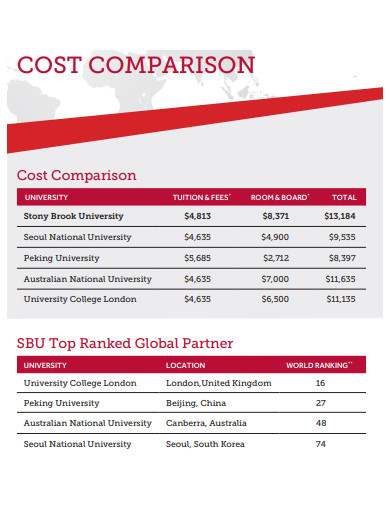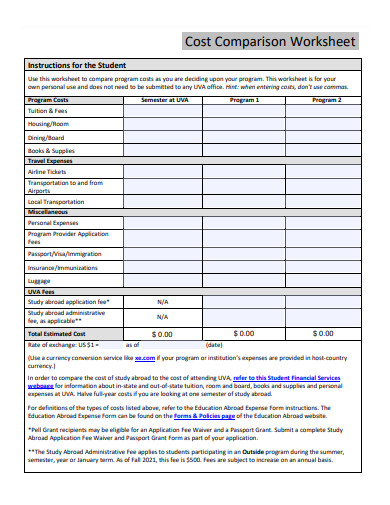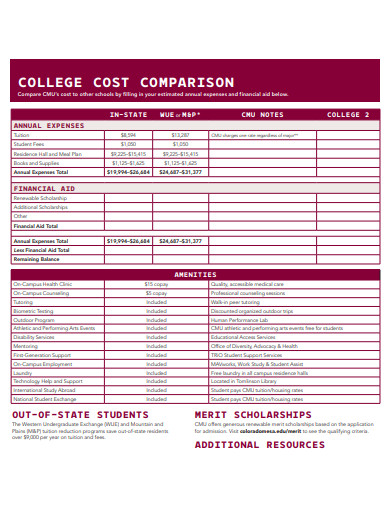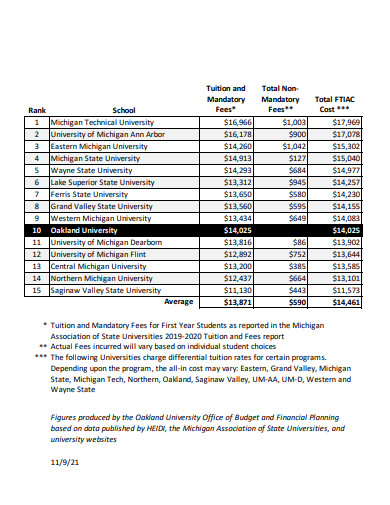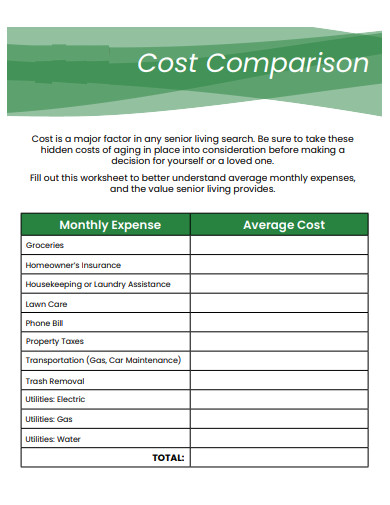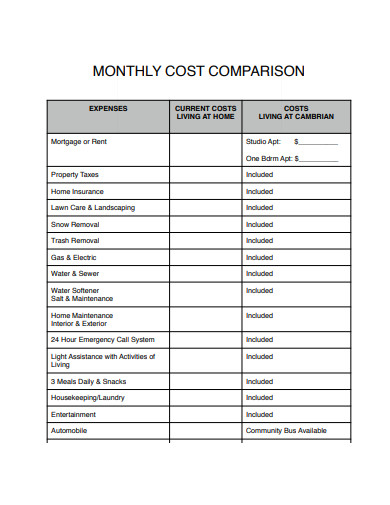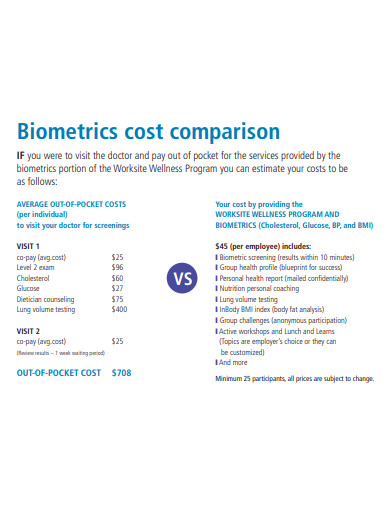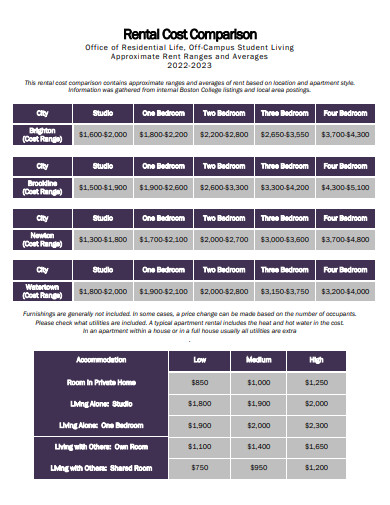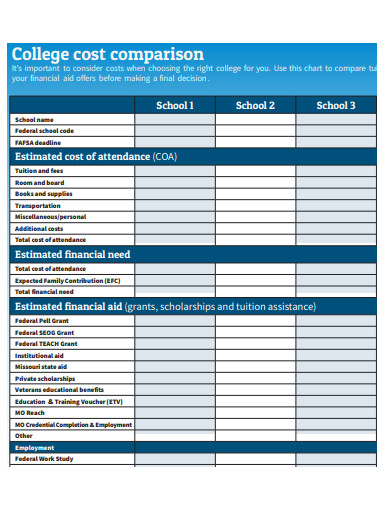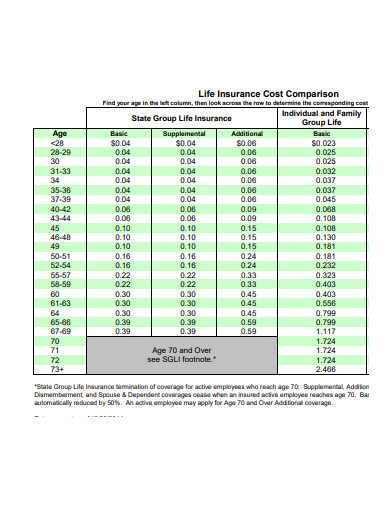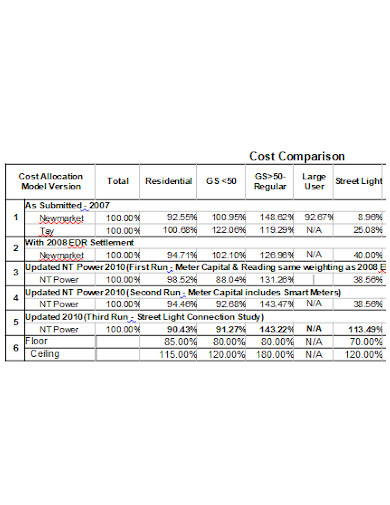10+ Cost Comparison Samples
Before making a purchase, shoppers should compare prices since it allows them to locate better bargains on the same item or similar things at lower rates. Comparing product pricing across several outlets (online and physical) will help you detect the differences and determine the true retail price of a product. You’ll not only get a better deal on the goods because of its age, but you’ll also get a better deal on new versions. How can you compare these prices? Through a cost comparison! If you need some help with making a cost comparison, look no further because we’ve got you covered. In this article, we provide you with free and ready-made samples of Cost Comparisons in PDF and DOC format that you could use for your benefit. Keep on reading to find out more!
1. Cost Comparison
2. Cost Comparison Worksheet
3. College Cost Comparison
4. Cost Comparison Chart
5. Sample Cost Comparison
6. Monthly Cost Comparison
7. Biometrics cost comparison
8. Rental Cost Comparison
9. Sample College Cost Comparison
10. Life Insurance Cost Comparison
11. Printable Cost Comparison
What Is a Cost Comparison?
Users can use cost comparison to compare the pricing of different goods within a specific category, such as house and auto insurance. Comparing the prices of the same goods in different stores is known as cost comparison. Price comparisons with significant rivals are used to determine price levels. It will be based on the landed price, which will include shipping, insurance, and the total cost of ownership, which will include spare parts, consumption, installation, commissioning, training, special packaging, and so on. Budget/internal estimations are compared.
How to make a cost comparison
We research costs before making a purchase decision because we want to save money. It goes without saying that in a price-sensitive climate like this, you must maintain track on competitor prices. A Cost Comparison Template can help provide you with the framework you need to ensure that you have a well-prepared and robust comparison on hand. To do so, you can choose one of our excellent templates listed above. If you want to write it yourself, follow these steps below to guide you:
1. Find your specialty.
Smart internet consumers may easily evaluate products/services and pricing before making a purchase using comparison websites. There are a number of decent, established comparison sites out there, but if you can identify a niche market or provide something unique, it’s a concept worth considering. Comparison sites may produce a lot of money if they’re properly monetized.
2. Select a model.
After you’ve decided on your market, you’ll need to figure out what your website will provide online customers. Will you shop primarily on ratings and reviews or will you evaluate like-for-like costs and features? Obviously, your model will be totally dependent on the market you choose, but we recommend doing a lot of research to discover what other sites have to offer, what works well, and what may be improved.
3. Determine the sources of your data.
Getting the data for your comparison website will most likely be the most difficult task. Data may be fed into your website in two ways. The first step is to obtain your information from each source directly. We may need to speak with each supplier’s IT department directly on your behalf in this case.
4. Investigate different revenue streams.
The majority of comparison sites give information to consumers for free and make money through affiliate sales, advertising, or commissions from suppliers. You should think about how you can make money.
FAQ
What is the purpose of price comparison websites?
It analyzes different e-commerce sites for information on items and services such as pricing, descriptions, features, and customer reviews, among other things. On a price comparison website, this data is integrated, and the results are personalized to the visitor’s search request.
Why do consumers compare prices?
Consumers said the most common reason they used comparison sites was to save money. Other prominent reasons were comparing a big number of suppliers, saving time, and gaining a comprehensive grasp of what is available and from whom.
What exactly do you mean when you say “dynamic pricing”?
Dynamic pricing, sometimes known as real-time pricing, is a method of determining a product’s or service’s cost that is very adaptable.
Comparisons have become one of the most essential sources in the purchasing decision-making process for customers. To help you get started, download our easily customizable and comprehensive samples of Cost Comparisons today!
Related Posts
FREE 10+ Brand Story Samples in PDF | MS Word
FREE 10+ Brand Guidelines Samples in PDF | MS Word
FREE 10+ Employee Offboarding Samples in PDF | MS Word
FREE 10+ Process Documentation Samples in PDF | MS Word
FREE 3+ Introduction About Myself Samples in PDF
FREE 10+ Process Map Samples in PDF | MS Word
FREE 10+ Decision Matrix Samples in MS Word | PDF | DOC
FREE 10+ Diversity and Inclusion Statement Samples [ University, Faculty, Value ]
FREE 10+ Bid Comparison Samples in PDF | MS Word
FREE 10+ HR Records Samples in PDF | MS Word
FREE 10+ Brand Brief Samples in PDF | MS Word
FREE 10+ Merger and Acquisition Template Samples in PDF | MS Word
FREE 10+ Brand Pyramid Samples in PDF
FREE 10+ Workflow Mapping Samples in PDF | MS Word
FREE 10+ Requirements Gathering Samples in PDF | MS Word

